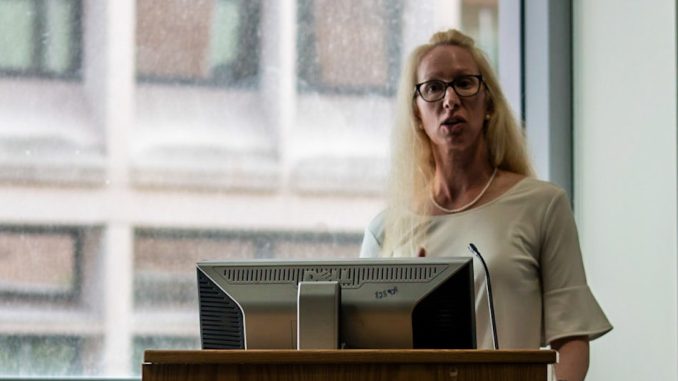
Temple University’s Vice President for Public Safety Jennifer Griffin is looking for ways for Campus Safety Services to improve their reach to students about safety on and near Main Campus.
Griffin is developing a marketing and communications working group to gather student feedback, improve their communication strategies, strengthen its digital presence and recruit more officers.
Representatives from Temple’s office of Strategic Communications and David Boardman, dean of the Klein College of Media and Communication, will be advising Griffin on ways to improve communication, Griffin wrote in an email to The Temple News.
“We can always be better communicators, right?” Griffin said. “That’s the hardest thing because there’s so much volume of information. For us, it’s really finding and figuring out what’s the best way to communicate with students, parents, faculty, staff and the surrounding community.”
The working group comes as Griffin, who started the brand-new position on Aug. 22, is making her “90 days of listening and learning tour,” where she is building relationships by participating in ride alongs and foot patrols. Griffin has also met with student groups for feedback.
Temple University Police Department currently tries to make students aware of safety resources and updates through their social media platforms including Twitter where they have more than 5,000 followers and Instagram where they have nearly 1,000. The university also notifies students of crime on or near campus through TU Alerts.
Natalie Reap, a senior recreational therapy major, is not satisfied with the frequency and timeliness of TU Alerts.
“Oftentimes, I don’t even get TU Alerts when things happen, which is kind of unfortunate that I have to rely on other means to find out things that are happening on campus,” Reap said.
TU Alerts are written in a template that only allows a certain number of characters to avoid giving out too much information in case the initial report of the incident is not accurate, Griffin said.
Last year, some students said they relied on apps like Citizen to become aware of local crimes, like shootings or robberies.
Reap hopes the university shortens the time it takes for alerts to be released and that they improve how it informs students of available safety services, like FLIGHT and walking escorts.
A lot of the students Griffin has spoken to are not aware of the safety prevention measures that Temple offers, she said.
Temple can engage students about what safety resources are available through interactive social media strategies like infographics, videos and audio reels, said Dave Anderson, professor of social media marketing.
“It needs to have really vibrant colors and it needs to be attention getting because otherwise it’s just going to become white noise competing with the thousands of other social media accounts that are out there,” Anderson said.
Other students, like Evlad Fonda, a junior kinesiology major, believe Temple’s communication systems are helpful to students because alerts are sent to multiple platforms.
“I get them all the time,” Fonda said. “They come to my phone and my email too. So, I think there’s no way to miss it, so they do a good job letting you know.”
One way to make campus safer is to increase the number of resources available to help the community around Temple, Anderson said. He implored the university to think of ways to uplift the community and provide additional support.
“We should use social media, we should be doing those things,” Anderson said. “But I think a lot of this comes down to not only being reactionary but being very proactive in how we address the overreaching problem of what’s happening in our community because like it or not, as long as Temple sits in North Philadelphia, it’s our community too.”
Fallon Roth contributed reporting.



Be the first to comment